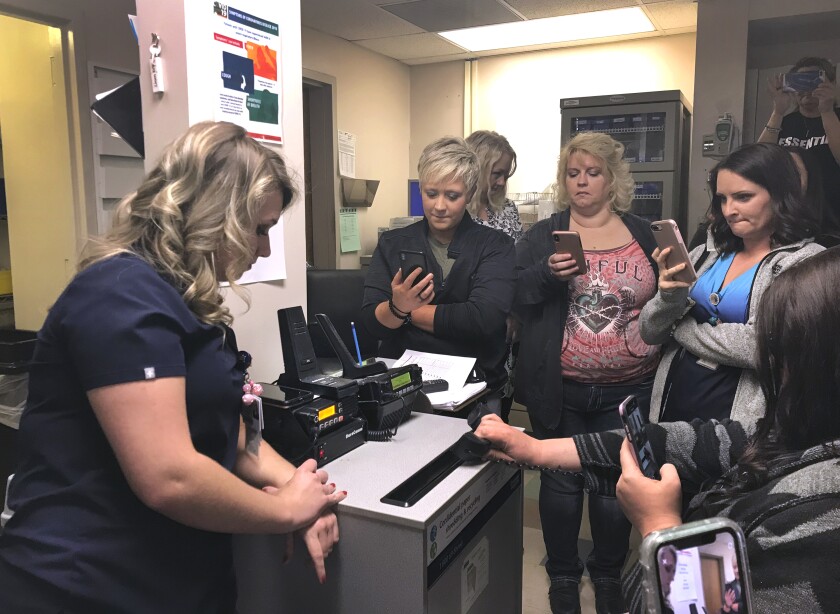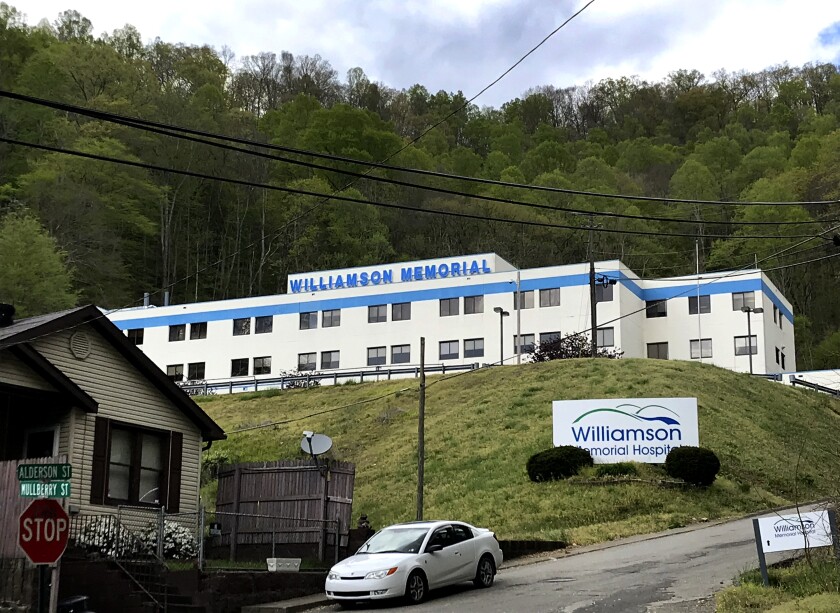In a time of pandemic, another rural hospital shuts its doors

Williamson Memorial Hospital staff huddle in the nurses station for a ceremonial last call from the emergency dispatcher. (Jenny Jarvie / Los Angeles Times)
WILLIAMSON, W.Va. — The red “Emergency” sign glowed above the empty ER waiting room as Loretta Simon walked to the front door and posted a notice that Williamson Memorial Hospital was shutting down.
It was just after 1:15 a.m. The emergency room beds were vacant. The last staff on duty were clocking out. Soon she would switch off the heart monitor in the nurses’ station and watch its screen fade to black.
As the 48-year-old chief nursing officer stepped outside to block the ER entrance with yellow caution tape, she thought of all the people she had treated in her 25 years at the hospital: elderly patients who had suffered strokes, coal miners injured underground or laboring to breathe with black lung disease, patients of all ages who had overdosed on opioids and methamphetamines.

Loretta Simon, chief nursing officer, puts up caution tape outside the ER after her last shift at the now-defunct Williamson Memorial Hospital in Williamson, W.Va.
(Jenny Jarvie / Los Angeles Times)
She wasn’t sure when, or even if, the emergency room would open again.
While big hospitals in places such as New York City, Detroit and New Orleans have been overwhelmed with a massive surge of COVID-19 cases, Williamson Memorial is one of hundreds of rural hospitals across the nation that have suffered from an altogether different crisis: a massive drop in patients.
The struggling 76-bed hospital in this rugged Appalachian coal country town of 2,800 residents was forced to close down last month after the global coronavirus pandemic hit just as administrators were trying to climb out of bankruptcy and work out a deal for another hospital to take over.
The only hospital in Mingo County, a remote pocket of West Virginia, Williamson Memorial did not treat any patients with COVID-19 — so far, the county of 23,400 residents has confirmed just three cases and one death. But the hospital’s net revenue was slashed in half as administrators halted nonessential procedures and visits to the emergency room plummeted from about 800 to 300 a month.
And so this former mining town, nestled in a narrow valley surrounded by hills of poplar and oak, has lost the hospital that served its people for more than a century.
“It’s heartbreaking,” Simon said. “It’s hard not to feel a little defeated that we have all these people in our hospital who have all this skill, who know how to take care of patients. But yet when the need is going to hit, we’re not going to be here.”

Williamson Memorial, the only hospital in Mingo County, W.Va., served the remote area for over a century. (Jenny Jarvie / Los Angeles Times)
It’s a pattern that is likely to play out across the nation as COVID-19 unsettles the precarious finances of hundreds of small rural hospitals. Already, more than 170 have closed in the last 15 years, according to the University of North Carolina’s Rural Health Research Program. Last year, 18 shut their doors — the most since 2000 — and 12 have shuttered in the first four months of this year.
“It’s hard to envision a scenario in which we do not see a lot more hospitals closing,” said Alan Morgan, chief executive of the National Rural Health Assn., noting that in February, the nonprofit group identified more than 400 hospitals at risk for closure. “Things have only gotten significantly worse.”
According to a recent report by the American Hospital Assn., hospitals and health systems across the nation face unprecedented financial challenges in the coming months, with an estimated loss of more than $200 billion from COVID-19 expenses from March to June.
After cancelling all outpatient and elective procedures, which account for 70% to 80% of revenue, Morgan said, many hospitals are furloughing and laying off staff. In April, the healthcare sector lost 1.4 million jobs, according to the U.S. Bureau of Labor Statistics, with nearly 135,000 hospital workers laid off across the country.













![Foothills-Bundle] Foothills-Bundle](https://old.thelevisalazer.com/wp-content/uploads/2020/05/Foothills-Bundle-422x74.jpg)





Williamson Memorial Hospital was much more than a hospital to the workers (and even some patients). I worked at WMH for six years and that place became a second home to me. In this small town of ours, you learn who everyone is and you become close to coworkers, patients, and their family members. I truly hope it reopens soon because our town definitely needs it.